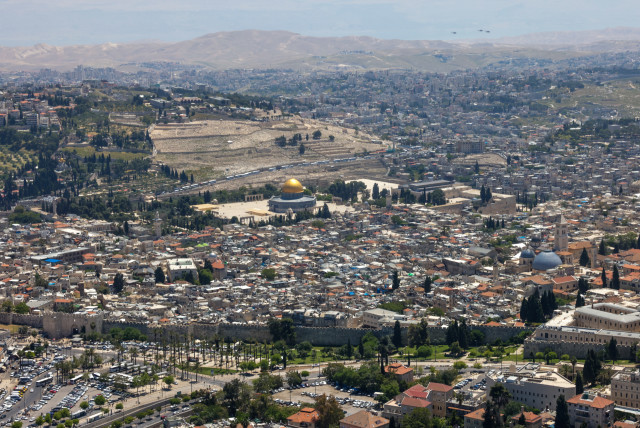Jerusalem Day: The miracle we live in - opinion

Virtually all (Zionist) rabbis agree that the blessing must be said on the Hallel of Jerusalem Day, for that event came purely “min hashamayim,” from heaven itself, a precious gift from God.
A song of ascents: When we, the Prisoners of Zion, shall finally return, we shall be like dreamers. Our voices will be filled with laughter, our tongues with boundless joy.
The nations of the world will declare, ‘God has performed mightily for them.’
And we shall be happy, resurgent as springs in the desert. For those who sowed in tears will now reap in gladness and exuberant song. (Psalm 126)
The Torah reading that presciently precedes Jerusalem Day discusses the laws of shmita, the sabbatical year when fields are left fallow and farmers do not work the land. But, says the verse, what will happen when the people will cry out and ask, “Where will our sustenance come from when the fields are dormant?”
And so God replies, “I shall send a special blessing to the land, and it will miraculously yield an abundant, threefold harvest in the sixth year, one that will be sufficient to feed you through the sixth, seventh and eighth years.”
The rabbis then add: “And what will happen if we do not cry out, if we have pure faith that the Almighty will provide? Then, an even greater miracle will occur. The harvest of the sixth year will be a normal one, such that we need work no harder than usual to collect the crops and process them. Yet somehow, that one year’s produce will last for three full years and will satisfy all of our needs.” In short, the miracle will occur in our stomachs, not in our silos.
The essence of this dramatic statement is that for those who are deserving, miracles will come to them not with fanfare or gasps of disbelief but, rather, unobtrusively, dressed in normal, everyday clothes. The greater the individual and the deeper one’s faith in the Almighty, the less obvious will be the extraordinary blessings that come his or her way. As the Talmud (Nida 31) succinctly sums it up: The recipients of a miracle do not recognize their miracle.
And so it is with us. We are not just surrounded by occasional miracles; as if moving within the eye of a hurricane, we are smack-dab in the middle of an ongoing, continuous miracle. And yet, because it is so pervasive and ever-present, we hardly notice it. But that does not mean it is not there.
Morning, afternoon and evening, we bless God “for the miracles that accompany us each day.” This blessing is surely true for every Jew in every place on the planet, considering that we have survived throughout the millennia despite so many attempts by now-defunct empires to eliminate us. But it particularly applies to those of us living in the “re-Jew-venated” State of Israel, and it is even more mind-bending that today we are in complete control of our eternal capital, Jerusalem, the elusive jewel in the crown of every would-be invader.
Imagine if we were transported in time to the dreadful years following Rome’s destruction of the Temple and the razing of Jerusalem, and we told the downtrodden survivors that we are living witnesses to the holy city being rebuilt in all its glory, with hundreds of “miniature temples” where hundreds of thousands daily pray and sing. They would be thrilled beyond belief! And imagine that we told the victims of the horrendous Crusades that it would be the Jewish people who would have sovereignty over Jerusalem, and not the Christians or Muslims, who were then viciously vying for that honor. Imagine that we told the victims of the Shoah that in just a few short years, there would be a vibrant Jewish country that would boast the world’s finest army, dedicated to the safety of every Jew, everywhere.
They would stare at us – like dreamers – with wide-eyed, tearful disbelief, and shake their heads, whispering, “If only it were so.” But it is so, and – like the birth of a seventh or eighth child – we have become somewhat numbed by the normalcy and everyday occurrence of our miraculous achievement.
The religious significance of Jerusalem Day
THERE IS a rabbinic debate as to whether a blessing should be recited when saying the Hallel celebratory prayers on Independence Day, as that day and date was essentially man-made, dictated by the United Nations and verified by Ben-Gurion’s government-in-waiting. But virtually all (Zionist) rabbis agree that the blessing must be said on the Hallel of Jerusalem Day, for that event came purely “min hashamayim,” from heaven itself, a precious gift from God.
The confluence of events that resulted in our reunification of Jerusalem is stunning beyond belief.
We actually had no intention of bringing the battle to Jerusalem when what would be called the Six Day War broke out. In fact, on the eve of the conflict, defense minister Moshe Dayan had cautioned army commanders in Jerusalem to avoid provocation of the Jordanian forces opposite them. A preemptive strike was going to be launched against Egypt, and Syria was also on the agenda, but Israel did not want to open yet another front, especially since the Jordanian Legion had been well trained by the British.
On June 5, as our planes returned from a devastatingly successful purge of the Egyptian Air Force, prime minister Levi Eshkol sent a message to Jordan’s King Hussein, who had signed a defense pact with Egypt the week before. “If Jordan makes no hostile move,” he wrote, “neither would Israel.”
But the Jordanians fell prey to the false propaganda being broadcast from Cairo, proclaiming that Tel Aviv was in flames and Egyptian forces were advancing on numerous cities. The jealous Jordanians wanted their piece of the pie, too, and so they made the calamitous – for them – decision to attack. Even then, OC Central Command Uzi Narkiss preferred to act defensively, but not to make a full-fledged move into the Old City.
It was at this point that two cabinet ministers from opposite ends of the political spectrum called for the capture of the Old City – Menachem Begin on the Right and Yigal Allon, of the kibbutz movement, on the Left. They pulled Eshkol into a closet and told him, “History will not forgive this government if we did not grasp the opportunity to restore Jewish rule over Jerusalem, 2,000 years after its fall to the Romans.” Eshkol was persuaded, and in lightning fashion, we took the Old City with relatively few casualties. And while Dayan handed control of the Temple Mount to Wakf Islamic religious trust officials – a catastrophic decision that haunts us until today – he also declared, “We have returned to the holiest of our sites and will never again be separated from it.”
As I walk through the streets and gates of Jerusalem new and old, I hear the voices of my ancestors, who beseeched God for centuries, “May You return to Your city and rebuild it.” And they ask me, “Do you realize what God has given you?! Do you appreciate the miracle that sings out to you from every brick and every bush? Do you know what it means to live a miracle?!”
Do we?
The writer is director of the Jewish Outreach Center of Ra’anana. jocmtv@netvision.net.il
Jerusalem Post Store
`; document.getElementById("linkPremium").innerHTML = cont; var divWithLink = document.getElementById("premium-link"); if (divWithLink !== null && divWithLink !== 'undefined') { divWithLink.style.border = "solid 1px #cb0f3e"; divWithLink.style.textAlign = "center"; divWithLink.style.marginBottom = "15px"; divWithLink.style.marginTop = "15px"; divWithLink.style.width = "100%"; divWithLink.style.backgroundColor = "#122952"; divWithLink.style.color = "#ffffff"; divWithLink.style.lineHeight = "1.5"; } } (function (v, i) { });

